2023-2024学年英语鲁教版(五四学制)九年级全一册Unit 7Life is full of the unexpected 单元复习课件(共30张PPT)
文档属性
| 名称 | 2023-2024学年英语鲁教版(五四学制)九年级全一册Unit 7Life is full of the unexpected 单元复习课件(共30张PPT) | 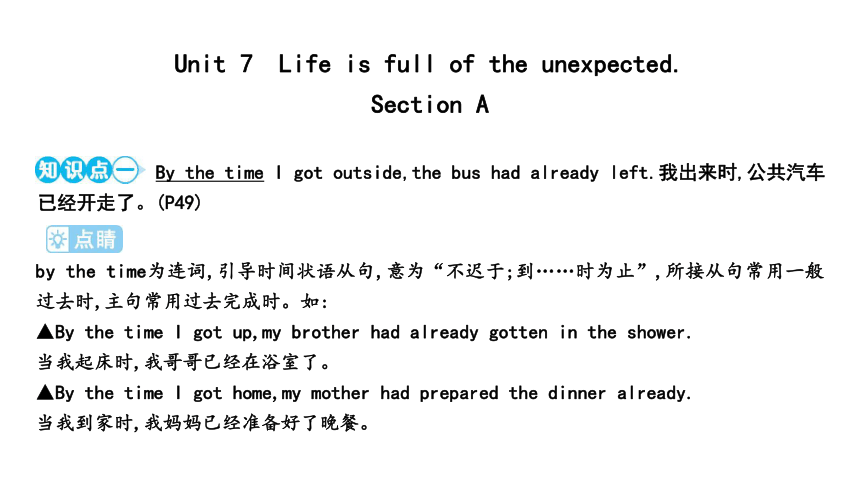 | |
| 格式 | pptx | ||
| 文件大小 | 394.9KB | ||
| 资源类型 | 教案 | ||
| 版本资源 | 鲁教版 | ||
| 科目 | 英语 | ||
| 更新时间 | 2024-07-08 19:51:23 | ||
图片预览

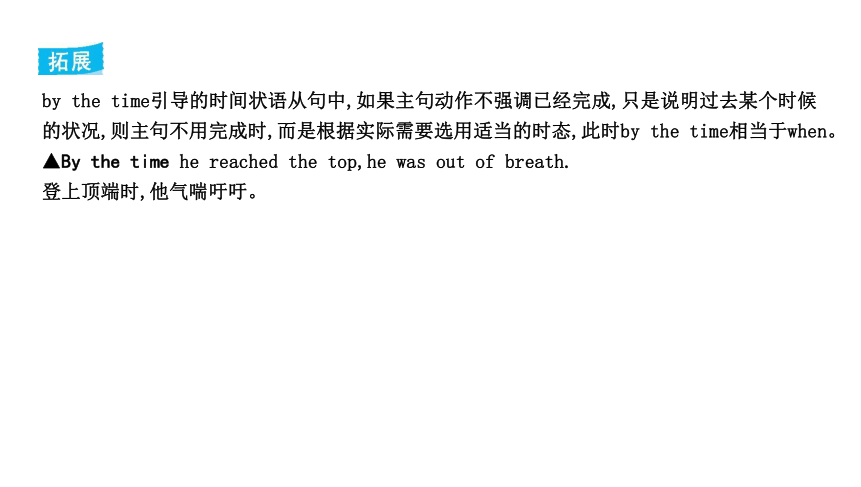
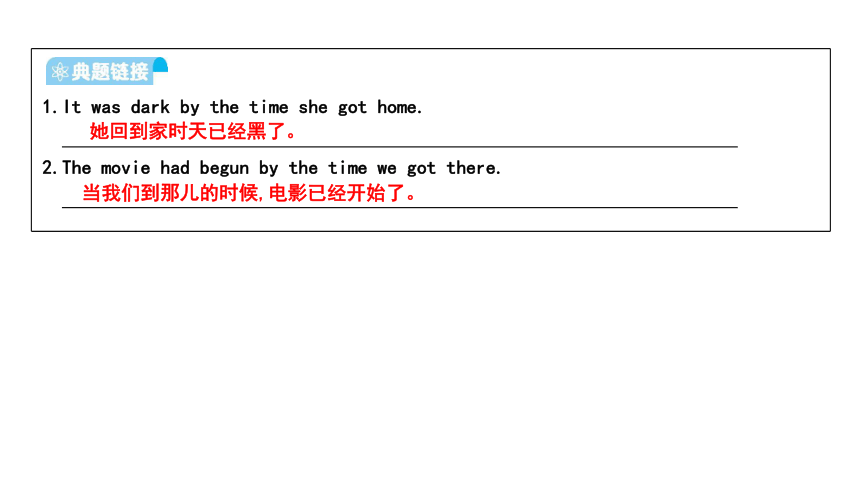
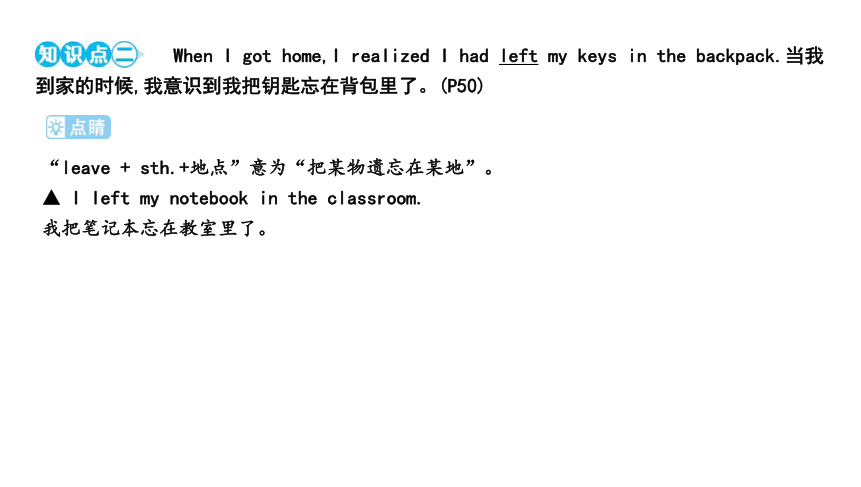
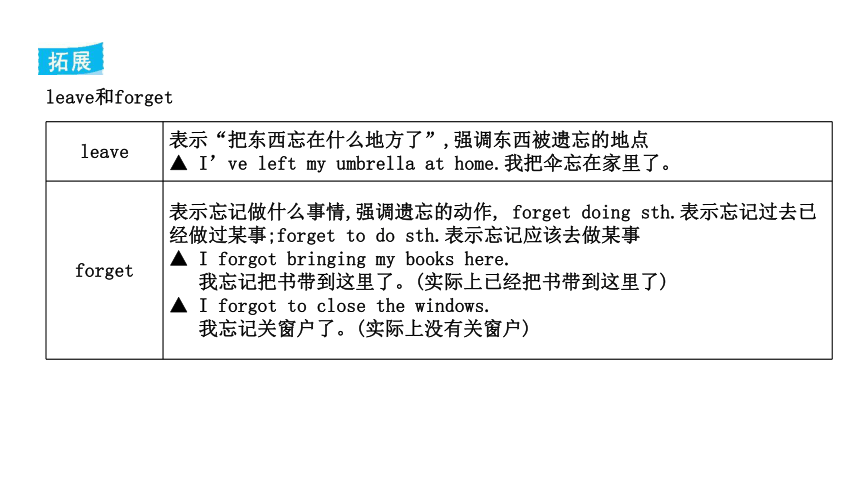
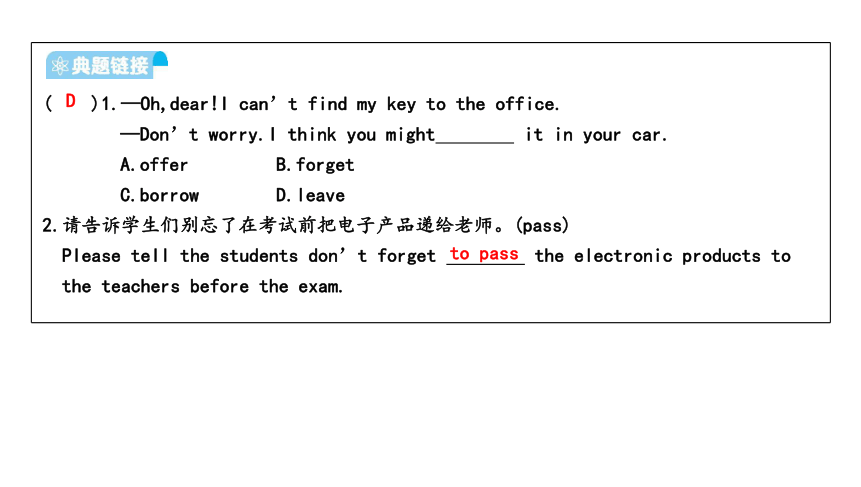
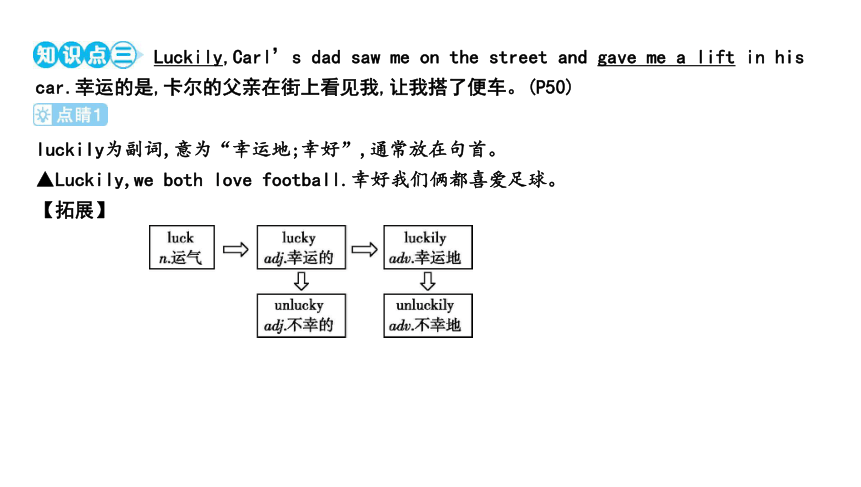
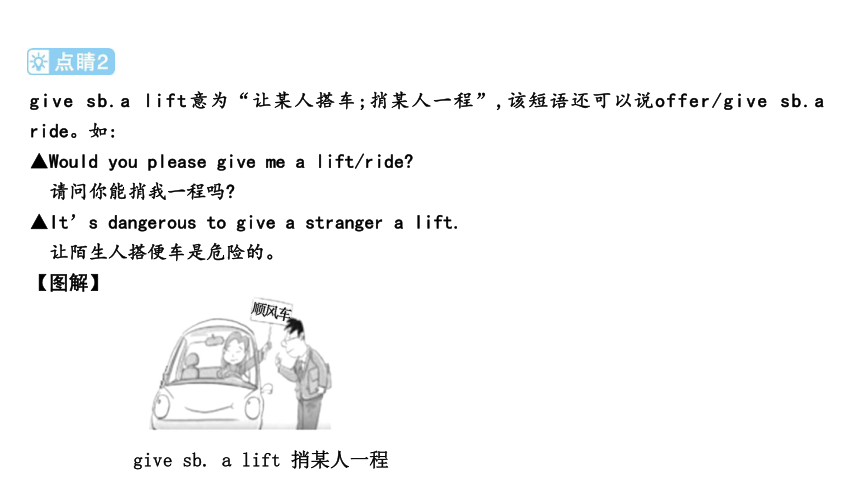
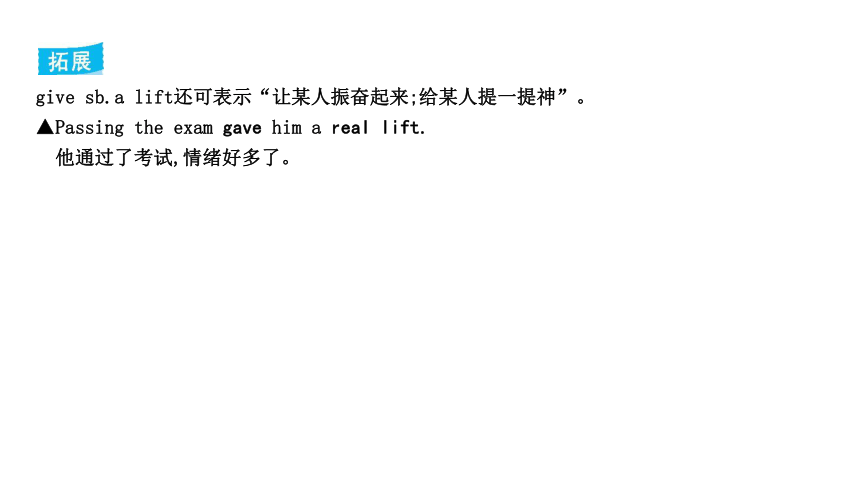
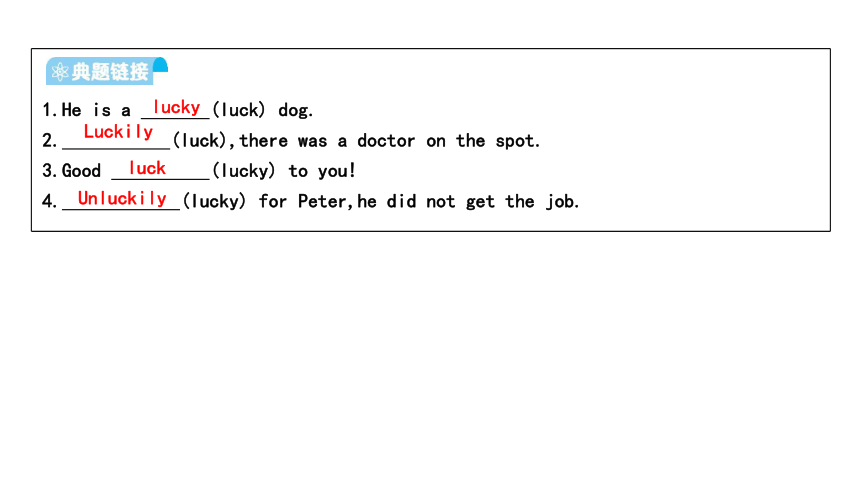
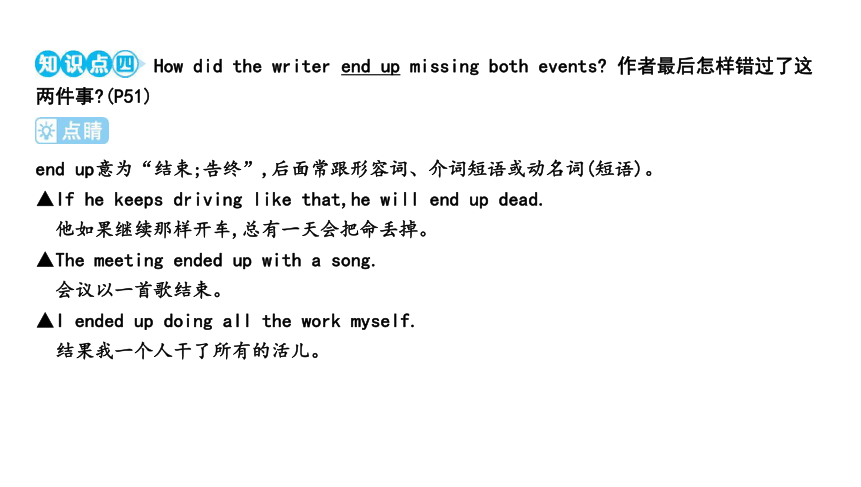
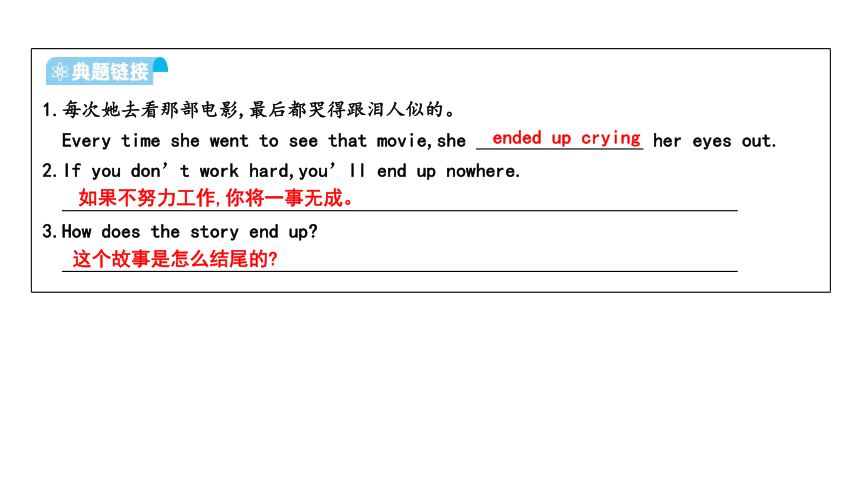
文档简介
(共30张PPT)
Unit 7 Life is full of the unexpected.
Section A
By the time I got outside,the bus had already left.我出来时,公共汽车已经开走了。(P49)
by the time为连词,引导时间状语从句,意为“不迟于;到……时为止”,所接从句常用一般过去时,主句常用过去完成时。如:
▲By the time I got up,my brother had already gotten in the shower.
当我起床时,我哥哥已经在浴室了。
▲By the time I got home,my mother had prepared the dinner already.
当我到家时,我妈妈已经准备好了晚餐。
by the time引导的时间状语从句中,如果主句动作不强调已经完成,只是说明过去某个时候的状况,则主句不用完成时,而是根据实际需要选用适当的时态,此时by the time相当于when。
▲By the time he reached the top,he was out of breath.
登上顶端时,他气喘吁吁。
1.It was dark by the time she got home.
.
2.The movie had begun by the time we got there.
.
她回到家时天已经黑了。
当我们到那儿的时候,电影已经开始了。
When I got home,I realized I had left my keys in the backpack.当我到家的时候,我意识到我把钥匙忘在背包里了。(P50)
“leave + sth.+地点”意为“把某物遗忘在某地”。
▲ I left my notebook in the classroom.
我把笔记本忘在教室里了。
leave和forget
leave 表示“把东西忘在什么地方了”,强调东西被遗忘的地点
▲ I’ve left my umbrella at home.我把伞忘在家里了。
forget 表示忘记做什么事情,强调遗忘的动作, forget doing sth.表示忘记过去已经做过某事;forget to do sth.表示忘记应该去做某事
▲ I forgot bringing my books here.
我忘记把书带到这里了。(实际上已经把书带到这里了)
▲ I forgot to close the windows.
我忘记关窗户了。(实际上没有关窗户)
( )1.—Oh,dear!I can’t find my key to the office.
—Don’t worry.I think you might it in your car.
A.offer B.forget
C.borrow D.leave
2.请告诉学生们别忘了在考试前把电子产品递给老师。(pass)
Please tell the students don’t forget the electronic products to
the teachers before the exam.
D
to pass
Luckily,Carl’s dad saw me on the street and gave me a lift in his car.幸运的是,卡尔的父亲在街上看见我,让我搭了便车。(P50)
luckily为副词,意为“幸运地;幸好”,通常放在句首。
▲Luckily,we both love football.幸好我们俩都喜爱足球。
【拓展】
give sb.a lift意为“让某人搭车;捎某人一程”,该短语还可以说offer/give sb.a ride。如:
▲Would you please give me a lift/ride
请问你能捎我一程吗
▲It’s dangerous to give a stranger a lift.
让陌生人搭便车是危险的。
【图解】
give sb. a lift 捎某人一程
give sb.a lift还可表示“让某人振奋起来;给某人提一提神”。
▲Passing the exam gave him a real lift.
他通过了考试,情绪好多了。
1.He is a (luck) dog.
2. (luck),there was a doctor on the spot.
3.Good (lucky) to you!
4. (lucky) for Peter,he did not get the job.
lucky
Luckily
luck
Unluckily
end up意为“结束;告终”,后面常跟形容词、介词短语或动名词(短语)。
▲If he keeps driving like that,he will end up dead.
他如果继续那样开车,总有一天会把命丢掉。
▲The meeting ended up with a song.
会议以一首歌结束。
▲I ended up doing all the work myself.
结果我一个人干了所有的活儿。
How did the writer end up missing both events 作者最后怎样错过了这两件事 (P51)
1.每次她去看那部电影,最后都哭得跟泪人似的。
Every time she went to see that movie,she her eyes out.
2.If you don’t work hard,you’ll end up nowhere.
.
3.How does the story end up
.
ended up crying
如果不努力工作,你将一事无成。
这个故事是怎么结尾的
I was about to go up when I decided to get a coffee first.我正准备上楼,这时候我决定先去买杯咖啡。(P51)
be about to do sth.意为“即将、马上做某事”,表示按计划、安排即将发生某事。如:
▲We are about to start.
我们就要出发了。
▲The new school year is about to begin.
新学年开学在即。
【注意】be about to不能与tomorrow,next week等表示明确将来的时间状语连用。
【图解】
1.That might be about to change.
.
2.We are going to fix the broken machine.
.
那种情况可能即将发生变化。
我们将要修理那台坏机器。
We stared in disbelief at the black smoke rising above the burning building.我们直愣愣地盯着燃烧着的大楼上升起的黑烟,无法相信(这一切)。(P51)
stare是动词,意为“盯着看;凝视”。stare at意为“盯着……看;凝视……”。
▲It’s rude to stare at people.
盯着人看不礼貌。
▲His eyes stared straight ahead.
他双眼凝视着前方。
stare 还可作名词,意为“凝视;注视”。
▲He stared at me with a cold stare.
他冷漠地凝视着我。
in disbelief意为“怀疑地;难以置信地”。
▲He looked me up and down in disbelief.
他以怀疑的眼光上下打量着我。
in表示“在……状态之中”,常用短语:
【图解】
above作介词,意为“在……上面”。
▲The temperature today is just above 20 degrees.
今天的温度恰恰20度出头。
【图解】on,above,over的“高度”不一样!
1.“你确定你能自己解决这个问题吗 ”彼得怀疑地问我。
“Are you sure you can work out the problem yourself ”Peter asked me
.
2.“我不想别人盯着我看,”他妈妈说。
“I don’t want people to me,” said his mother.
3.鸟儿在房子上空飞。
The birds are flying the house.
in disbelief
stare at
above
By the time I arrived at the party,everyone else had already shown up.当我到达聚会时,其他所有人都已经赶到了。(P52)
else意为“别的;其他的”,else常位于不定代词、疑问词之后。
▲—What else do you want
你还想要别的什么
—Nothing else.
别的什么也不要了。
show up意为“如约赶到;露面”,相当于appear。
▲We waited until five o’clock,but he did not show up.
我们一直等到了五点钟,但他始终没有露面。
与show相关的常见短语
show off炫耀;卖弄 show sb.around带领某人参观
on show展出;展览 talent show才艺展示
( )1.When the best singer in our class ,everyone shouted with
excitement.
A.look up B.put up
C.showed up D.made up
2.把这个包拿走,其他所有东西都给我留下。
Take this bag,and leave to me.
3.她喜欢炫耀她的精美衣服。
She likes to her fine clothes.
C
everything else
show off
Section B
Many people ran to their local supermarkets to buy as much spaghetti as they could.许多人跑到他们当地的超市购买尽可能多的意大利面。(P54)
或“much+不可数名词”。
▲Please come here as early as you can.=Please come here as early as possible.
请尽可能早点儿来。
▲You should take as much money as you can.
你应该尽量多带些钱。
【图解】
do as much as possible尽可能多地做
1.Speak English as much as and you’ll make great progress in
spoken English one day.
2.You should come to see your parents as often as possible.(改为同义句)
(2022重庆模拟)
You should come to see your parents as often as .
possible
you can
By the time people realized that the story was a hoax,all of the spaghetti across the country had been sold out.当人们意识到这是个骗局的时候,全国的意大利面已经销售一空了。(P54)
sell out为固定短语,意为“售完;卖光”,为动副短语,后接代词作宾语时,代词须放于sell与out之间。
▲All of the magazines were sold out yesterday in this bookstore.
昨天这家书店里所有的杂志都卖光了。
▲These books written by my teacher are popular.We’ve sold them out.
我的老师写的这些书很受欢迎,我们已经把它们全卖完了。
【归纳】out短语大聚会
( )1.My cousin volunteers in the Children’s Home.His job is to food
and clothes.
A.sell out
B.work out
C.hand out
D.find out
2.本来就只有几本书,恐怕我们已经卖完了。
There are only a few books.I’m afraid we’ve them .
3.老师分发了试卷。
The teacher the exam papers.
C
sold
out
handed out
He asked her to marry him.The lady was so happy because she really wanted to get married.他向她求婚。这位女士很高兴,因为她真的想结婚。(P54)
marry在句中作及物动词,意为“娶……;嫁给……”。如:
▲She wants to marry a Chinese.
她想嫁个中国人。
marry 还有另外的“婚嫁”方式
(1)be married意为“结婚”,表达状态,常用于婚姻状况。如:
▲They have been married for 20 years.
他们已经结婚二十年了。
(2)be/get married to sb.表示“与某人结婚”。如:
▲Jane was married to a doctor last month.
上个月简和一位医生结婚了。
(3)marry sb. to sb.表示“把某人嫁给某人”或“让某人娶某人”。如:
▲She married her daughter to a businessman.
她把女儿嫁给了一位商人。
1.After two years,she got married to a foreigner.
.
2.He married his daughter to a farmer.
.
3.He married a doctor last year.
.
两年后,她和一个外国人结婚了。
他把女儿嫁给了一个农民。
他去年娶了一个医生。
Unit 7 Life is full of the unexpected.
Section A
By the time I got outside,the bus had already left.我出来时,公共汽车已经开走了。(P49)
by the time为连词,引导时间状语从句,意为“不迟于;到……时为止”,所接从句常用一般过去时,主句常用过去完成时。如:
▲By the time I got up,my brother had already gotten in the shower.
当我起床时,我哥哥已经在浴室了。
▲By the time I got home,my mother had prepared the dinner already.
当我到家时,我妈妈已经准备好了晚餐。
by the time引导的时间状语从句中,如果主句动作不强调已经完成,只是说明过去某个时候的状况,则主句不用完成时,而是根据实际需要选用适当的时态,此时by the time相当于when。
▲By the time he reached the top,he was out of breath.
登上顶端时,他气喘吁吁。
1.It was dark by the time she got home.
.
2.The movie had begun by the time we got there.
.
她回到家时天已经黑了。
当我们到那儿的时候,电影已经开始了。
When I got home,I realized I had left my keys in the backpack.当我到家的时候,我意识到我把钥匙忘在背包里了。(P50)
“leave + sth.+地点”意为“把某物遗忘在某地”。
▲ I left my notebook in the classroom.
我把笔记本忘在教室里了。
leave和forget
leave 表示“把东西忘在什么地方了”,强调东西被遗忘的地点
▲ I’ve left my umbrella at home.我把伞忘在家里了。
forget 表示忘记做什么事情,强调遗忘的动作, forget doing sth.表示忘记过去已经做过某事;forget to do sth.表示忘记应该去做某事
▲ I forgot bringing my books here.
我忘记把书带到这里了。(实际上已经把书带到这里了)
▲ I forgot to close the windows.
我忘记关窗户了。(实际上没有关窗户)
( )1.—Oh,dear!I can’t find my key to the office.
—Don’t worry.I think you might it in your car.
A.offer B.forget
C.borrow D.leave
2.请告诉学生们别忘了在考试前把电子产品递给老师。(pass)
Please tell the students don’t forget the electronic products to
the teachers before the exam.
D
to pass
Luckily,Carl’s dad saw me on the street and gave me a lift in his car.幸运的是,卡尔的父亲在街上看见我,让我搭了便车。(P50)
luckily为副词,意为“幸运地;幸好”,通常放在句首。
▲Luckily,we both love football.幸好我们俩都喜爱足球。
【拓展】
give sb.a lift意为“让某人搭车;捎某人一程”,该短语还可以说offer/give sb.a ride。如:
▲Would you please give me a lift/ride
请问你能捎我一程吗
▲It’s dangerous to give a stranger a lift.
让陌生人搭便车是危险的。
【图解】
give sb. a lift 捎某人一程
give sb.a lift还可表示“让某人振奋起来;给某人提一提神”。
▲Passing the exam gave him a real lift.
他通过了考试,情绪好多了。
1.He is a (luck) dog.
2. (luck),there was a doctor on the spot.
3.Good (lucky) to you!
4. (lucky) for Peter,he did not get the job.
lucky
Luckily
luck
Unluckily
end up意为“结束;告终”,后面常跟形容词、介词短语或动名词(短语)。
▲If he keeps driving like that,he will end up dead.
他如果继续那样开车,总有一天会把命丢掉。
▲The meeting ended up with a song.
会议以一首歌结束。
▲I ended up doing all the work myself.
结果我一个人干了所有的活儿。
How did the writer end up missing both events 作者最后怎样错过了这两件事 (P51)
1.每次她去看那部电影,最后都哭得跟泪人似的。
Every time she went to see that movie,she her eyes out.
2.If you don’t work hard,you’ll end up nowhere.
.
3.How does the story end up
.
ended up crying
如果不努力工作,你将一事无成。
这个故事是怎么结尾的
I was about to go up when I decided to get a coffee first.我正准备上楼,这时候我决定先去买杯咖啡。(P51)
be about to do sth.意为“即将、马上做某事”,表示按计划、安排即将发生某事。如:
▲We are about to start.
我们就要出发了。
▲The new school year is about to begin.
新学年开学在即。
【注意】be about to不能与tomorrow,next week等表示明确将来的时间状语连用。
【图解】
1.That might be about to change.
.
2.We are going to fix the broken machine.
.
那种情况可能即将发生变化。
我们将要修理那台坏机器。
We stared in disbelief at the black smoke rising above the burning building.我们直愣愣地盯着燃烧着的大楼上升起的黑烟,无法相信(这一切)。(P51)
stare是动词,意为“盯着看;凝视”。stare at意为“盯着……看;凝视……”。
▲It’s rude to stare at people.
盯着人看不礼貌。
▲His eyes stared straight ahead.
他双眼凝视着前方。
stare 还可作名词,意为“凝视;注视”。
▲He stared at me with a cold stare.
他冷漠地凝视着我。
in disbelief意为“怀疑地;难以置信地”。
▲He looked me up and down in disbelief.
他以怀疑的眼光上下打量着我。
in表示“在……状态之中”,常用短语:
【图解】
above作介词,意为“在……上面”。
▲The temperature today is just above 20 degrees.
今天的温度恰恰20度出头。
【图解】on,above,over的“高度”不一样!
1.“你确定你能自己解决这个问题吗 ”彼得怀疑地问我。
“Are you sure you can work out the problem yourself ”Peter asked me
.
2.“我不想别人盯着我看,”他妈妈说。
“I don’t want people to me,” said his mother.
3.鸟儿在房子上空飞。
The birds are flying the house.
in disbelief
stare at
above
By the time I arrived at the party,everyone else had already shown up.当我到达聚会时,其他所有人都已经赶到了。(P52)
else意为“别的;其他的”,else常位于不定代词、疑问词之后。
▲—What else do you want
你还想要别的什么
—Nothing else.
别的什么也不要了。
show up意为“如约赶到;露面”,相当于appear。
▲We waited until five o’clock,but he did not show up.
我们一直等到了五点钟,但他始终没有露面。
与show相关的常见短语
show off炫耀;卖弄 show sb.around带领某人参观
on show展出;展览 talent show才艺展示
( )1.When the best singer in our class ,everyone shouted with
excitement.
A.look up B.put up
C.showed up D.made up
2.把这个包拿走,其他所有东西都给我留下。
Take this bag,and leave to me.
3.她喜欢炫耀她的精美衣服。
She likes to her fine clothes.
C
everything else
show off
Section B
Many people ran to their local supermarkets to buy as much spaghetti as they could.许多人跑到他们当地的超市购买尽可能多的意大利面。(P54)
或“much+不可数名词”。
▲Please come here as early as you can.=Please come here as early as possible.
请尽可能早点儿来。
▲You should take as much money as you can.
你应该尽量多带些钱。
【图解】
do as much as possible尽可能多地做
1.Speak English as much as and you’ll make great progress in
spoken English one day.
2.You should come to see your parents as often as possible.(改为同义句)
(2022重庆模拟)
You should come to see your parents as often as .
possible
you can
By the time people realized that the story was a hoax,all of the spaghetti across the country had been sold out.当人们意识到这是个骗局的时候,全国的意大利面已经销售一空了。(P54)
sell out为固定短语,意为“售完;卖光”,为动副短语,后接代词作宾语时,代词须放于sell与out之间。
▲All of the magazines were sold out yesterday in this bookstore.
昨天这家书店里所有的杂志都卖光了。
▲These books written by my teacher are popular.We’ve sold them out.
我的老师写的这些书很受欢迎,我们已经把它们全卖完了。
【归纳】out短语大聚会
( )1.My cousin volunteers in the Children’s Home.His job is to food
and clothes.
A.sell out
B.work out
C.hand out
D.find out
2.本来就只有几本书,恐怕我们已经卖完了。
There are only a few books.I’m afraid we’ve them .
3.老师分发了试卷。
The teacher the exam papers.
C
sold
out
handed out
He asked her to marry him.The lady was so happy because she really wanted to get married.他向她求婚。这位女士很高兴,因为她真的想结婚。(P54)
marry在句中作及物动词,意为“娶……;嫁给……”。如:
▲She wants to marry a Chinese.
她想嫁个中国人。
marry 还有另外的“婚嫁”方式
(1)be married意为“结婚”,表达状态,常用于婚姻状况。如:
▲They have been married for 20 years.
他们已经结婚二十年了。
(2)be/get married to sb.表示“与某人结婚”。如:
▲Jane was married to a doctor last month.
上个月简和一位医生结婚了。
(3)marry sb. to sb.表示“把某人嫁给某人”或“让某人娶某人”。如:
▲She married her daughter to a businessman.
她把女儿嫁给了一位商人。
1.After two years,she got married to a foreigner.
.
2.He married his daughter to a farmer.
.
3.He married a doctor last year.
.
两年后,她和一个外国人结婚了。
他把女儿嫁给了一个农民。
他去年娶了一个医生。
同课章节目录
- Unit 1 When was it invented?
- Section A
- Section B
- Unit 2 Teenagers should be allowed to choose their
- Section A
- Section B
- Unit 3 It must belong to Carla.
- Section A
- Section B
- Unit 4 I like music that I can dance to.
- Section A
- Section B
- Unit 5 You’re supposed to shake hands.
- Section A
- Section B
- Unit 6 Sad movies make me cry.
- Section A
- Section B
- Unit 7 Life is full of the unexpected.
- Section A
- Section B
- Unit 8 We're trying to save the earth!
- Section A
- Section B
- Unit 9 It's important to have good habits.
- Section A
- Section B
- Unit 10 I remember meeting all of you in Grade 6.
- Section A
- Section B
